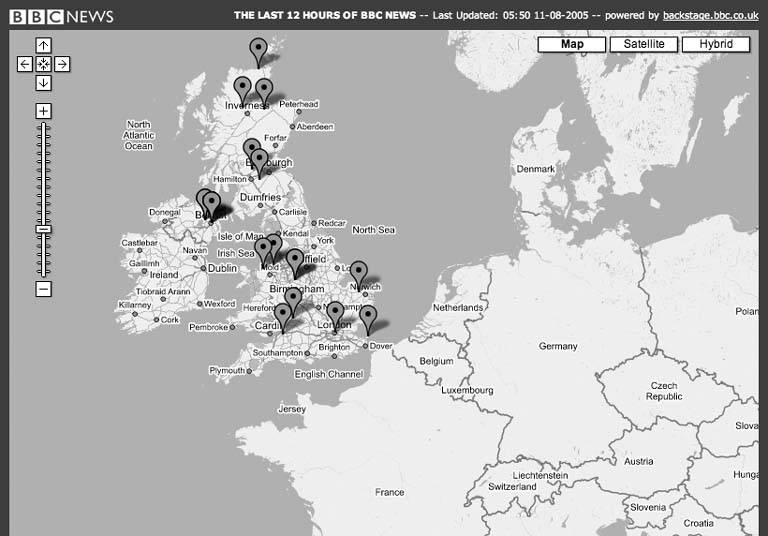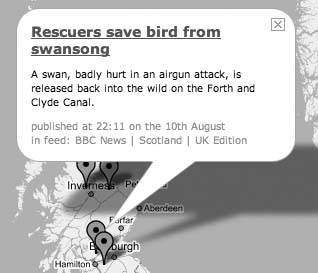Hack 17. Map the News


See where it happened with BBC News and Google Maps.
Human beings have spent most of their time in small groups of 100-odd individuals, and our information-processing abilities came from those experiences, not from our current world. If we want to keep track of disturbances in Denmark, fog in Finland, elections in Istanbul, and war all over, we need tools to help us: assisted cognition.
At http://boneill.ninjagrapefruit.com/wp-content/bbc/newmaps/ you can see the locations associated with the last 12 hours of BBC news, as shown in Figure 3-1. As with most cartographic efforts, there is the nearly inevitable, but still regrettable, focus on just one placeso the last 12 hours of BBC news will generally be more interesting if you prefer news of the British Isles.
Clicking on the markers brings up an information window like that shown in Figure 3-2. This includes the lead from the story, as well as date and time information and a link to the full story. As we can see, human interest and soft news can make an appearance!
This hack is possible because, well, the BBC rocks. They have decided that their responsibility to the public trust means they need to open their content to the public. See http://backstage.bbc.co.uk/ for data and ideas so that you can "build what you want using BBC content." This is the heart of the Web 2.0 conceptthe idea that open APIs and open formats allow us to make more use of and draw richer connections between the vast amounts of information that are already out there on the Internet.
Figure 3-1. Geolocations for the last 12 hours of BBC News

Figure 3-2. Not all geolocated news is created equal

In 2003, the BBC announced plans to open their archives of radio and television programs for non-commercial use. Its intent is good, but sadly there are issues that must be worked out. Ben Hammersley wrote a stirring call to action for the Guardian at http://www.guardian.co.uk/online/story/0,,1522351,00.html.
The archive, Ben writes, "is a vault of the most important public culture of the past three generations. It is a gift for the future that is so far-sighted, and so much a good thing, that it is the duty of the BBC and, especially, the government to follow through."
What's more, "[d]igital technology not only makes the Creative Archive possible, but by doing so makes it a moral imperative." Mapping the news is an example of something we can do now, with just the textual content. Imagine the possibilities of geocoded audio and video!
As Ben's article concludes, "Now that we can, we must."
You Are Here: Introducing Google Maps
- Hacks 19: Introduction
- Hack 1. Get Around http://maps.google.com
- Hack 2. Find Yourself (and Others) on Google Maps
- Hack 3. Navigate the World in Your Web Browser
- Hack 4. Get the Birds-Eye View
- Hack 5. Driven to a Better User Interface
- Hack 6. Share Google Maps
- Hack 7. Inside Google Maps URLs
- Hack 8. Generate Links to Google Maps in a Spreadsheet
- Hack 9. Use del.icio.us to Keep Up with Google Maps
Introducing the Google Maps API
- Hacks 1016: Introduction
- Hack 10. Add a Google Map to Your Web Site
- Hack 11. Where Did the User Click?
- Hack 12. How Far Is That? Go Beyond Driving Directions
- Hack 13. Create a Route with a Click (or Two)
- Hack 14. Create Custom Map Markers
- Hack 15. Map a Slideshow of Your Travels
- Hack 16. How Big Is the World?
Mashing Up Google Maps
- Hacks 1728: Introduction
- Hack 17. Map the News
- Hack 18. Examine Patterns of Criminal Activity
- Hack 19. Map Local Weather Conditions
- Hack 20. Track Official Storm Reporting
- Hack 21. Track the International Space Station
- Hack 22. Witness the Effects of a Nuclear Explosion
- Hack 23. Find a Place to Live
- Hack 24. Search for Events by Location
- Hack 25. Track Your UPS Packages
- Hack 26. Follow Your Packets Across the Internet
- Hack 27. Add Google Maps to Any Web Site
- Hack 28. How Big Is That, Exactly?
On the Road with Google Maps
- Hacks 2941: Introduction
- Hack 29. Find the Best Gasoline Prices
- Hack 30. Stay Out of Traffic Jams
- Hack 31. Navigate Public Transportation
- Hack 32. Locate a Phone Number
- Hack 33. Why Your Cell Phone Doesnt Work There
- Hack 34. Publish Your Own Hiking Trail Maps
- Hack 35. Load Driving Directions into Your GPS
- Hack 36. Get Driving Directions for More Than Two Locations
- Hack 37. View Your GPS Tracklogs in Google Maps
- Hack 38. Map Your Wardriving Expeditions
- Hack 39. Track Your Every Move with Google Earth
- Hack 40. The Ghost in Google Ride Finder
- Hack 41. How Google Maps Got Me Out of a Traffic Ticket
Google Maps in Words and Pictures
- Hacks 4250: Introduction
- Hack 42. Get More out of What You Read
- Hack 43. Dont Believe Everything You Read on a Map
- Hack 44. You Got Your A9 Local in My Google Maps!
- Hack 45. Share Pictures with Your Community
- Hack 46. Browse Photography by Shooting Location
- Hack 47. Geotag Your Own Photos on Flickr
- Hack 48. Tell Your Communitys Story
- Hack 49. Generate Geocoded RSS from Any Google Map
- Hack 50. Geoblog with Google Maps in Thingster
API Tips and Tricks
- Hacks 5161: Introduction
- Hack 51. Make a Fullscreen Map the Right Way
- Hack 52. Put a Map and HTML into Your Info Windows
- Hack 53. Add Flash Applets to Your Google Maps
- Hack 54. Add a Nicer Info Window to Your Map with TLabel
- Hack 55. Put Photographs on Your Google Maps
- Hack 56. Pin Your Own Maps to Google Maps with TPhoto
- Hack 57. Do a Local Zoom with GxMagnifier
- Hack 58. Find the Right Zoom Level
- Hack 59. Show Lots of StuffQuickly
- Hack 60. Make Things Happen When the Map Moves
- Hack 61. Use the Right Developers Key Automatically
Extreme Google Maps Hacks
- Hacks 6270: Introduction
- Hack 62. Find the Latitude and Longitude of a Street Address
- Hack 63. Read and Write Markers from a MySQL Database
- Hack 64. Build Custom Icons on the Fly
- Hack 65. Add More Imagery with a WMS Interface
- Hack 66. Add Your Own Custom Map
- Hack 67. Serve Custom Map Imagery
- Hack 68. Automatically Cut and Name Custom Map Tiles
- Hack 69. Cluster Markers at High Zoom Levels
- Hack 70. Will the Kids Barf? (and Other Cool Ways to Use Google Maps)
EAN: 2147483647
Pages: 131
